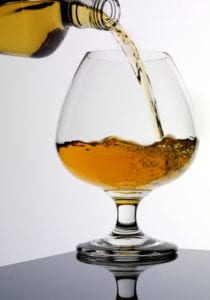Written by Joyce Smith, BS. Study participants with mild cognitive impairment, who consumed more than 14 alcoholic drinks per week, had the most severe cognitive decline compared with consumers of less than 1.0 drink per week.
 To determine whether alcohol consumption is associated with the risk of dementia and cognitive decline in older adults, with or without mild cognitive impairment (MCI), and whether MCI and APOE E4 genotype may play a role in this association, Koch and team analyzed data from the Ginkgo Evaluation of Memory Study (GEMS) 1. GEMS was a randomized controlled eight-year long trial (2000-2008) of US community-dwelling participants who were given the Modified Mini-Mental State Examination, the Clinical Dementia Rating scale, and the cognitive portion of the Alzheimer’s disease Assessment Scale to assess dementia potential. The study found no association between gingko supplementation and dementia 2.
To determine whether alcohol consumption is associated with the risk of dementia and cognitive decline in older adults, with or without mild cognitive impairment (MCI), and whether MCI and APOE E4 genotype may play a role in this association, Koch and team analyzed data from the Ginkgo Evaluation of Memory Study (GEMS) 1. GEMS was a randomized controlled eight-year long trial (2000-2008) of US community-dwelling participants who were given the Modified Mini-Mental State Examination, the Clinical Dementia Rating scale, and the cognitive portion of the Alzheimer’s disease Assessment Scale to assess dementia potential. The study found no association between gingko supplementation and dementia 2.
The present study by Koch et al, 3 utilized data from a cohort of 3021 GEMS participants, aged 72 years and older, dementia free at baseline, who provided information regarding their alcohol intake. Their median age was 78 years; 46.2% were female and fifty-eight percent consumed alcohol. The prevalence of diabetes and MC) at baseline were highest among nondrinkers, but approximately 45%of participants with baseline MCI reported current alcohol consumption. Also at baseline, higher reported alcohol consumption was associated with higher levels of high-density lipoprotein cholesterol (sex-adjusted correlation coefficient, r = 0.18; P < .001) and higher levels of apoA-1 (r = 0.20; P < .001) 4.
During a 6-year follow-up, 512 cases of dementia occurred, including 348 cases of Alzheimer’s disease. Alcohol consumption within recommended limits was not significantly associated with a lower risk of dementia among participants with or without MCI at baseline. However, when compared to light drinkers who consumed less than one drink per week, those with MCI at baseline who consumed more than 14 drinks per week, had an HR of 1.72, while for those who consumed 7-14 drinks per week, adjusted HR was 0.63 among the 2,548 participants without MCI and 0.93 among those 473 participants with MCI.
Among adults with normal cognition at baseline, daily low quantity drinking was associated with a lower dementia risk (HR = 0.45; 95% CI, 0.23-0.89; P = 0.02) compared to infrequent higher-quantity drinking.
The hazard ratio (HR) for dementia for nondrinkers compared with light drinkers was 1.17 (95%CI, 0.84-1.62; P for quadratitrend = 0.07).
Also, the association of alcohol intake with dementia differed for participants with and without baseline MCI (P for interaction = 0.03). Among participants without MCI, daily low-quantity drinking was associated with a lower dementia risk than infrequent higher quantity drinking (hazard ratio, 0.45; 95%CI, 0.23-0.89; P = 0.02). Among participants with MCI, consumers of more than 14.0 drinks per week had the most severe cognitive decline compared to consumers of less than 1.0 drink per week.
These results suggest that while caring for older adults, physicians should carefully assess the full dimensions of drinking behavior and cognition when providing guidance to patients about alcohol consumption. These study results could not be generalized to a younger population nor translated into clinical recommendations; therefore, additional studies are warranted to confirm these associations further.
Source: Manju Koch, PhD; Annette L. Fitzpatrick, PhD; Stephen R. Rapp, PhD; Richard L. Nain, PhD, MPH; Jeff D. Williamson, MD; Oscar L. Lopez, MD; Steven T. Demoski, MD; Lewis H. Kuller,MD, DrPH; Rachel H. Mackey, PhD, MPH; Kenneth J. Mukamal, MD, MPH; Majken K. Jensen, PhD; Kaycee M. Sink, MD, MAS. Alcohol Consumption and Risk of Dementia and Cognitive Decline Among Older Adults With or Without Mild Cognitive Impairment. JAMA Network Open. 2019;2(9):e1910319. doi:10.1001/jamanetworkopen.2019.10319
Open Access. This is an open access article distributed under the terms of the CC-BY License.
Click here to read the full text study.
Posted October 21, 2019.
Joyce Smith, BS, is a degreed laboratory technologist. She received her bachelor of arts with a major in Chemistry and a minor in Biology from the University of Saskatchewan and her internship through the University of Saskatchewan College of Medicine and the Royal University Hospital in Saskatoon, Saskatchewan. She currently resides in Bloomingdale, IL.
References:
- DeKosky ST, Fitzpatrick A, Ives DG, et al. The Ginkgo Evaluation of Memory (GEM) study: design and baseline data of a randomized trial of Ginkgo biloba extract in prevention of dementia. Contemp Clin Trials. 2006;27(3):238-253.
- DeKosky ST, Williamson JD, Fitzpatrick AL, et al. Ginkgo biloba for prevention of dementia: a randomized controlled trial. Jama. 2008;300(19):2253-2262.
- Koch M, Fitzpatrick AL, Rapp SR, et al. Alcohol Consumption and Risk of Dementia and Cognitive Decline Among Older Adults With or Without Mild Cognitive Impairment. JAMA Netw Open. 2019;2(9):e1910319.
- Linn S, Carroll M, Johnson C, Fulwood R, Kalsbeek W, Briefel R. High-density lipoprotein cholesterol and alcohol consumption in US white and black adults: data from NHANES II. Am J Public Health. 1993;83(6):811-816.
